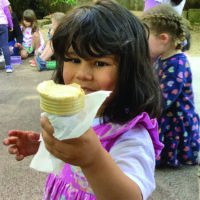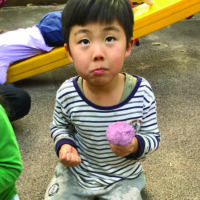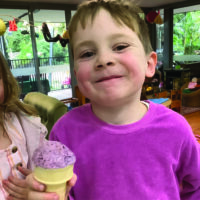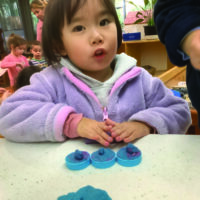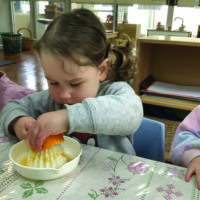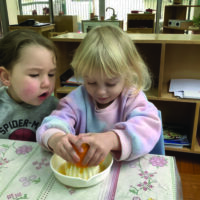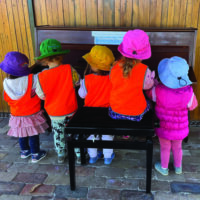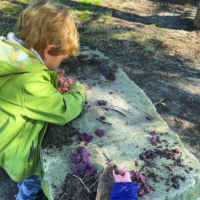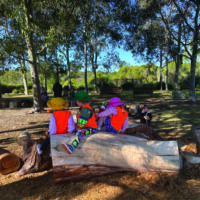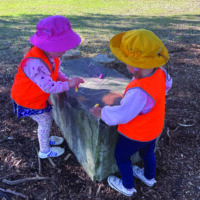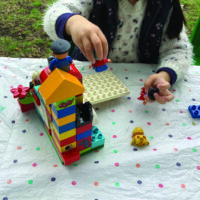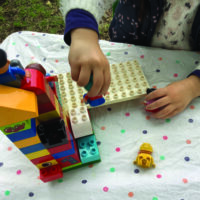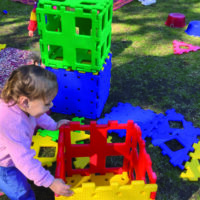Gorton House
Preschool
Story by Educator Nicky
Over the past weeks we have observed many children in Gorton House preschool motivated to play and explore ice cream shops. We have seen several little groups of peers setting up pretend shops in the sandpit or the cubby and arranging containers of sand, mixing ingredients (leaves, sand and water) to create ice blocks and ice cream which have then been arranged on counters and sold to customers. The children made signs informing their friends of the shop’s existence and the ice cream flavours available.
The children showed themselves to be quite resourceful, writing/drawing money and cutting it out, and sharing it with customers so that they would have the money they needed to buy any flavour they wanted. Seeing the children driven to involve as many people as possible was very rewarding to watch. We supported this play further by adding loose parts to the playdough area, where the children used recycled lids and small pots as ice cream cones. This triggered the children’s ideas for cupcakes and cookies and all sorts of other foods (even calamari and hot dogs!), but the drive for ice cream continued to grow.
The children began talking about making real ice cream. We were not surprised, as we have known no bounds when it has come to food and experimenting with anything related to cooking and eating! So, ice cream recipes were sourced and the first flavour that children suggested was banana. Over the course of the week we experimented with making our own ice cream. While we had no doubt at all that we would succeed, we were still astounded at how amazingly good it ended up being—so much so that we had families seeking the recipes and planning to make these at home over the weekend.
The children engaged in every part of the process, from chopping the bananas, to deciding on the ingredients, and then scooping them in. We watched the ingredients blend in the blender and had taste tests in between just to check on those flavours. We compared textures and tastes and checked how sweet it tasted with and without some dates we’d sourced. Each day we decided which ingredients would be included the following day, so we had quite some variety, and every flavour was a hit. All up, we made several flavours that we tried throughout the week, including banana, banana and dates, strawberry, blueberry, pineapple, tropical fruit mix and mango with dates.
Waiting for the ice cream to freeze was the most difficult part and the children’s eagerness and curiosity led us to check the ice cream several times each day. As we did so, we noticed the gradual thickening and freezing of the mixtures in the freezer section. Every afternoon, we gathered and scooped ours homemade, additive free, delicious ice cream into cones and everyone was so very delighted. We were so grateful that it froze just in time each afternoon, and that families and siblings got to try our ice cream too as they arrived to find us eating it. We can’t wait for the next exciting idea we have.
Johnson House
Toddlers
Story by Educator Priya
To extend on children’s knowledge and understanding about healthy eating, the children in Johnson House toddlers made their own orange juice. The children were excited to participate in this experience and were very happy when they saw the basket of oranges.
The children sat at the table with their peers and an educator who spoke with them about the importance of eating fruit and vegetables. The educator also explained the orange juice making procedure and talked the about colour, size, and shapes of oranges and other fruits and vegetables.
The children were eager and excited for their turn to squeeze the oranges and they enjoyed watching their peers, saying “press harder!”. Some children used just one hand to squeeze the oranges while others preferred to use both hands.
When they all had orange juice to sample, the educator asked the children how it tasted. Some said “sour”, while some said, “my one is sweet”. This experience provided the children with opportunities to use and develop their sensory, language, fine motor, social, and mathematical skills.
We will continue to support our children’s learning about healthy eating through different experiences.
Family Day Care Sydney Wide
Story by Educator support Officer Barbara
Since our Randwick office and playgroup space closed at the end of June, we have been having our weekly play sessions in the Randwick Environmental Park where the children have been able to connect with nature and engage in a variety of activities.
They’ve played on the community piano, created playdough nature sculptures, made chalk art on the sandstone blocks and climbed on the logs and tree stumps. Through this ‘risky’ play they have tested their limits while developing their self-confidence and resilience. Risk taking in play allows children to develop decision making skills, extend their limits and learn new life skills such as problem solving.
The park has also been a lovely setting for our Acknowledgement of Country, singing songs and accompanying ourselves with tapping sticks.
Community Playgroups
Story by Playgroup Coordinator Rebecca
At playgroup we always have some type of blocks available for the children to play with. The blocks can be large or small, magnetic or push together like Lego, plastic or wooden. No matter the type of block, they all provide opportunities for learning and for children to develop their skills.
When children play with blocks and begin to construct with them, they often become engrossed in their play and can spend longer periods of time playing than they usually do. There are many reasons for this, but the first that comes to mind is that they are persevering to create something they have a vision of. For example, they may want to build the tallest tower or make a ramp for their cars. This perseverance results in increased concentration and extended attention spans.
When they are building together, blocks also help children to develop their social skills as they work in co-operation, sharing the blocks and deciding what to build and how to build it. Manipulating the blocks also helps to develop and strengthen the small muscles that are essential for everyday tasks such as dressing and writing.
Maths and science concepts are also developed through block play as children learn about weight, gravity, stability and balance. As they add blocks to their creations, mathematical language can be used as your child learns about adding and subtracting to what they are building. We can also introduce other new words to children as they build, such as ‘taller’, ‘shorter’, ‘stable’, ‘balance’, as well as words that introduce shapes and colours, and words that help your child to describe what they have built. These all help to increase your child’s vocabulary and knowledge.
Join in with your child when they are playing with blocks and have fun while you create and learn together.
